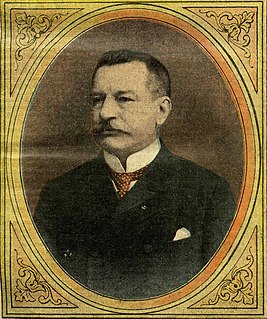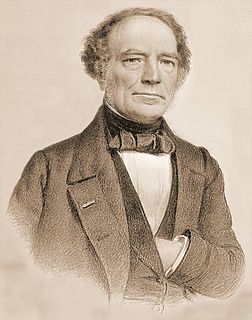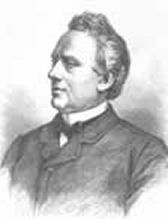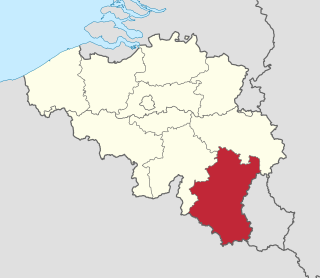
Transport in Belgium is facilitated with well-developed road, air, rail and water networks. The rail network has 2,950 km (1,830 mi) of electrified tracks. There are 118,414 km (73,579 mi) of roads, among which there are 1,747 km (1,086 mi) of motorways, 13,892 km (8,632 mi) of main roads and 102,775 km (63,861 mi) of other paved roads. There is also a well-developed urban rail network in Brussels, Antwerp and Charleroi. The ports of Antwerp and Bruges-Zeebrugge are two of the biggest seaports in Europe. Brussels Airport is Belgium's biggest airport.

Brussels-South is one of the three major railway stations in Brussels and the busiest station in Belgium. It is located on the territory of the municipality of Saint-Gilles/Sint-Gillis.

Jules Bara was a Belgian statesman and liberal politician.

Brussels-North is one of the three major railway stations in Brussels; the other two are Brussels Central and Brussels South. The station's bilingual French-Dutch name is generally translated to "Brussels North".

Partial legislative elections were held in Belgium on 5 and 12 July 1896. Under the alternating system, elections were held in only five out of the nine provinces: Antwerp, Brabant, Luxembourg, Namur and West Flanders. Thus, only 77 seats out of the 152 seats in the Chamber of Representatives were up for election. The Catholic Party retained their absolute majority.

Full general elections were held in Belgium on 27 May 1900.

Partial general elections were held in Belgium on 22 May 1910. The result was a victory for the Catholic Party, which won 49 of the 85 seats up for election in the Chamber of Representatives.

Full general elections were held in Belgium on 2 June 1912.

Partial general elections were held in Belgium on 24 May 1914. The result was a victory for the Catholic Party, which won 41 of the 88 seats up for election in the Chamber of Representatives.

General elections were held in Belgium on Tuesday 14 June 1892, the first full general elections since 1870 and the last before the introduction of universal male suffrage prior to the 1894 elections. The result was a victory for the Catholic Party, which won 92 of the 152 seats in the Chamber of Representatives and 46 of the 76 seats in the Senate. Only 2.2% of the country's population were eligible to vote.

Partial general elections were held in Belgium on Tuesday 11 June 1872. In the elections for the Chamber of Representatives the result was a victory for the Catholic Party, which won 71 of the 124 seats. Voter turnout was 55.5%, although only 54,933 people were eligible to vote.

Partial general elections were held in Belgium on 13 June 1876. In the elections for the Chamber of Representatives the result was a victory for the Catholic Party, which won 67 of the 124 seats. Voter turnout was 67.5%, although only 63,278 people were eligible to vote.

Partial general elections were held in Belgium on 14 June 1859. The result was a victory for the Liberal Party, which won 69 of the 116 seats in the Chamber of Representatives and 31 of the 58 seats in the Senate. Voter turnout was 55.9%, although only 49,672 people were eligible to vote.

Partial general elections were held in Belgium on 9 June 1863. The result was a victory for the Liberal Party, which won 59 of the 116 seats in the Chamber of Representatives and 33 of the 58 seats in the Senate. Voter turnout was 74.5%, although only 52,519 people were eligible to vote.

Partial general elections were held in Belgium on 13 June 1882. The result was a victory for the Liberal Party, which won 79 of the 138 seats in the Chamber of Representatives and 37 of the 69 seats in the Senate. Voter turnout was 75.1%, although only 55,517 people were eligible to vote.
Partial legislative elections were held in Belgium on Tuesday 13 June 1837 in which 51 of the 102 seats in the Chamber of Representatives were elected. Voter turnout was 56.0%, although only 24,526 people were eligible to vote. Under the alternating system, Chamber elections were only held in five out of the nine provinces: Antwerp, Brabant, Luxembourg, Namur and West Flanders. The Senate was not up for election.
Partial legislative elections were held in Belgium on Tuesday 8 June 1841 in which 48 of the 95 seats in the Chamber of Representatives were elected. Voter turnout was 77.0%, although only 24,887 people were eligible to vote. Under the alternating system, elections were only held in five out of the nine provinces: Antwerp, Brabant, Luxembourg, Namur and West Flanders.

Bel RTL is a commercial radio network broadcasting in Brussels and Wallonia. The station is owned by the Radio H holding company, which is part of the Luxembourg-based RTL Group.


















